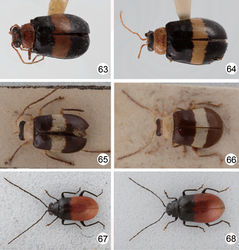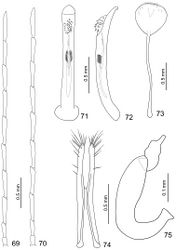Difference between revisions of "Dercetina unifasciata"
m (Imported from ZooKeys) |
m (1 revision) |
(No difference)
| |
Latest revision as of 11:58, 13 August 2013
| Notice: | This page is derived from the original publication listed below, whose author(s) should always be credited. Further contributors may edit and improve the content of this page and, consequently, need to be credited as well (see page history). Any assessment of factual correctness requires a careful review of the original article as well as of subsequent contributions.
If you are uncertain whether your planned contribution is correct or not, we suggest that you use the associated discussion page instead of editing the page directly. This page should be cited as follows (rationale):
Citation formats to copy and paste
BibTeX: @article{Lee2013ZooKeys323, RIS/ Endnote: TY - JOUR Wikipedia/ Citizendium: <ref name="Lee2013ZooKeys323">{{Citation See also the citation download page at the journal. |
Ordo: Coleoptera
Familia: Chrysomelidae
Genus: Dercetina
Name
Dercetina unifasciata (Allard, 1889) stat. r. and comb. n. – Wikispecies link – Pensoft Profile
- Antipha unifasciata Allard, 1889: 107; Kimoto 1989b[1]: 229. (as synonymy of Dercetina flavocincta)
Type material
Antipha unifasciata: Holotype ♀ (head lost; ISNB): “Cambodge / Coll. Chapuis / E. Allard det.: Antipha unifasciata All. / Antipha unifasciata All. (yellow label) / TYPE (pink label) / cf. Ann. Soc Ent. Belg., XXXIII, 1889, p. 107-108 / sec. Weise, Col. Cat. Junk (78), 1924: p. 145Dercetis unifasciata All.”.
Material examined
CAMBODIA: 1♀, Kampot prov., Bokor, 8.V.1961, leg. J. L. Nickel (USNM); INDIA: 1♀ (BMNH), Darjeeling, Bengal, Debrepani, 6000’, 18.IX.1929, leg. J.C.M. Gardner; LAOS: 1♀, Attapeu Prov., Houei Kong, 31.V.1965, leg. Native Collector (BPBM); 1♀, Borikhane Prov., Pakkading, 31.VII.1965, leg. Native Collector (BPBM); 1♀, Sayabouly Prov., Sayaboury, 16.IV.1965, leg. J. L. Gressitt (BPBM); 1♀, Sedone Prov., Paksong, 18.V.1965, leg. P. D. Ashlock (BPBM); 1♂, 1♀, Vientiane Prov., Ban Van Eue, 20km E of Phou-kow-kuei, 1–15.V.1965, leg. J. A. Rondon (BPBM); 1♂, same locality, 11.IV.1965, leg. J. L. Gressitt (KMNH); 1♂, 1♀, same locality, 12.IV.1965, leg. J. L. Gressitt (BPBM); 1♂, 15.VIII.1965, leg. J. L. Gressitt (BPBM); 1♀, same locality, 15.III.1966, leg. Native Collector (BPBM); 1♀, 15.XII.1966, leg. Native Collector (BPBM); 1♀, same locality, 2.II.1968, leg. Native Collector (BPBM); 1♀, same locality, 15.II.1968, leg. Native Collector (BPBM); 1♀, same locality, 15.VIII.1968, leg. Native Collector (BPBM); 1♀, Phou-kow-kuei, 15.IV.1965, leg. J. L. Gressitt (BPBM); 1♀, Vientiane Prov., Vientiane, 30.IV.1967, leg. Native Collector (BPBM); 1♀, Xieng Kyouang Prov., Ban Sam Thang, 5.XI.1965, leg. Native Collector (BPBM).
Diagnosis
Dercetina unifasciata is similar to Dercetina taiwana and Dercetina barclayi sp. n. with the evenly convex pronotum and similar color pattern but differing by antennomere IV much longer than III (1.8 times in Dercetina unifasciata in contrast with 1.2 or 1.3 times in Dercetina taiwana and Dercetina barclayi sp. n.).
Redescription
Color (Figs 63–64) bluish black, head, prothorax, coxae, and tibiae yellowish brown; elytra with one transverse white stripe at basal 1/3. Head smooth and impunctate. Pronotum transverse, 2.0 times wider than long, evenly convex on disc and lacking fovea or punctured depression, disc with scattered fine punctures; lateral margin almost straight, anterior margin slightly concave, posterior margin slightly rounded. Elytra more or less widened posteriorly, apex convergently rounded, 1.4 times longer than wide, disc with punctures in part arranged in longitudinal rows, epipleurae smooth and impunctate. Male. Length 4.7 mm, width 2.5 mm. Ratio of length of antennomeres III to XI about 1.0: 1.8: 1.9: 1.9: 1.9: 1.8: 1.8: 1.7: 2.0; ratio of length to width of antennomeres III to XI about 3.8: 6.0: 6.2: 6.1: 6.3: 5.9: 6.2: 6.3: 7.1 (Fig. 69). Penis (Fig. 71) extremely slender, about 11.0 times longer than wide, parallel-sided, basally and apically widened, apex narrowly rounded; tectum membranous, with scattered long setae; weakly curved in lateral view, apex recurved and pointed (Fig. 72); endophallic sclerites elongate, about 0.6 times as long as penis; apex pointed, ventrally covered with a small apically pointed sclerite; with a cluster of long setae at middle; sinuate in lateral view. Female. Length 4.7–5.8 mm, width 2.7–3.2 mm. Antenna filiform (Fig. 70), similar to male, ratio of length of antennomeres III to XI about 1.0: 1.7: 1.7: 1.7: 1.8: 1.7: 1.6: 1.5: 1.9; ratio of length to width of antennomeres III to XI about 3.9: 6.6: 6.2: 6.3: 6.3: 5.7: 5.7: 5.4: 6.7. Sternite VIII (Fig. 73) weakly sclerotized subapically, apex rounded, with dense short setae along apical margin, spiculum extremely long. Spermathecal receptaculum (Fig. 75) slightly swollen; pump narrow and strongly curved, apex widened and truncate; spermathecal duct short, narrowed in middle, shallowly projecting into receptaculum. Gonocoxae (Fig. 74) very close at middle, about 5.9 times longer than wide, slightly curved inwards near apex, apex rounded, with one or two short setae at apical 1/3, two subapically, eight setae at apex.
Distribution
Cambodia, India, Laos.
Taxon Treatment
- Lee, C; Bezděk, J; 2013: Revision of the genus Dercetina from Taiwan and their similar species, with description of a new species from Myanmar (Insecta, Chrysomelidae, Galerucinae) ZooKeys, 323: 1-33. doi
Other References
- ↑ Kimoto S (1989b) Chrysomelidae (Coleoptera) of Thailand, Cambodia, Laos and Vietnam. IV. Galerucinae. Esakia 27: 1-241.
Images
|

